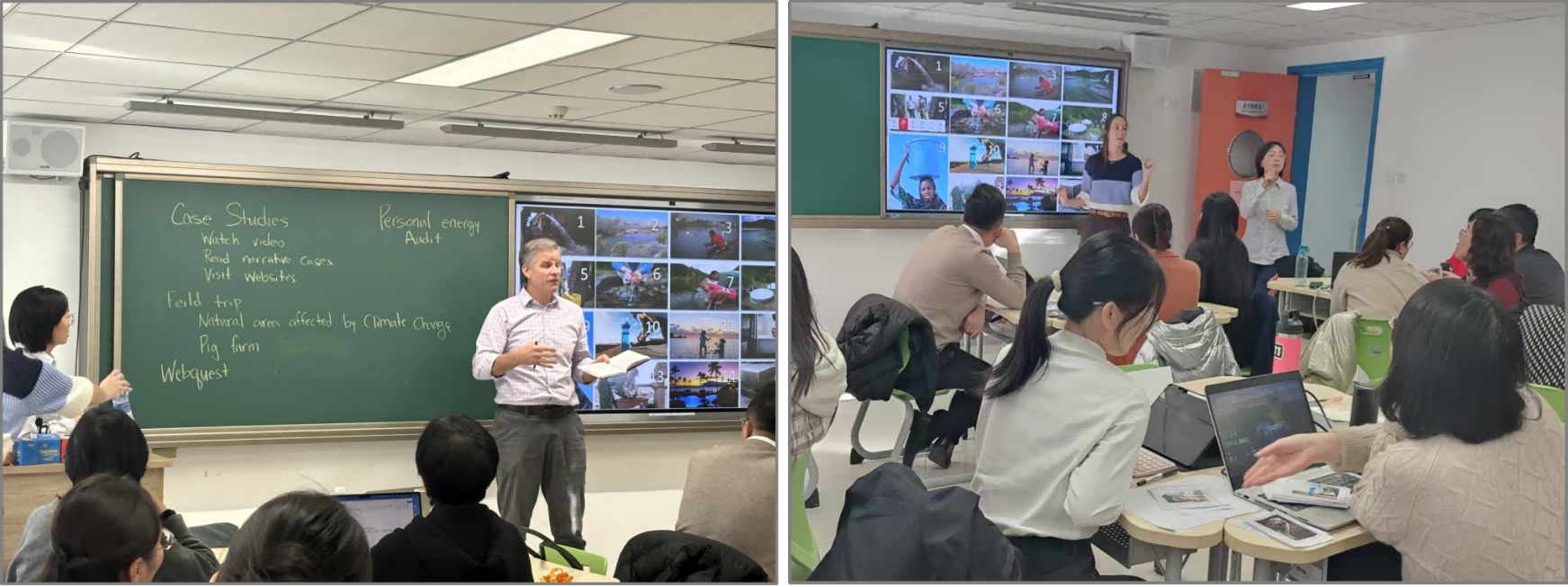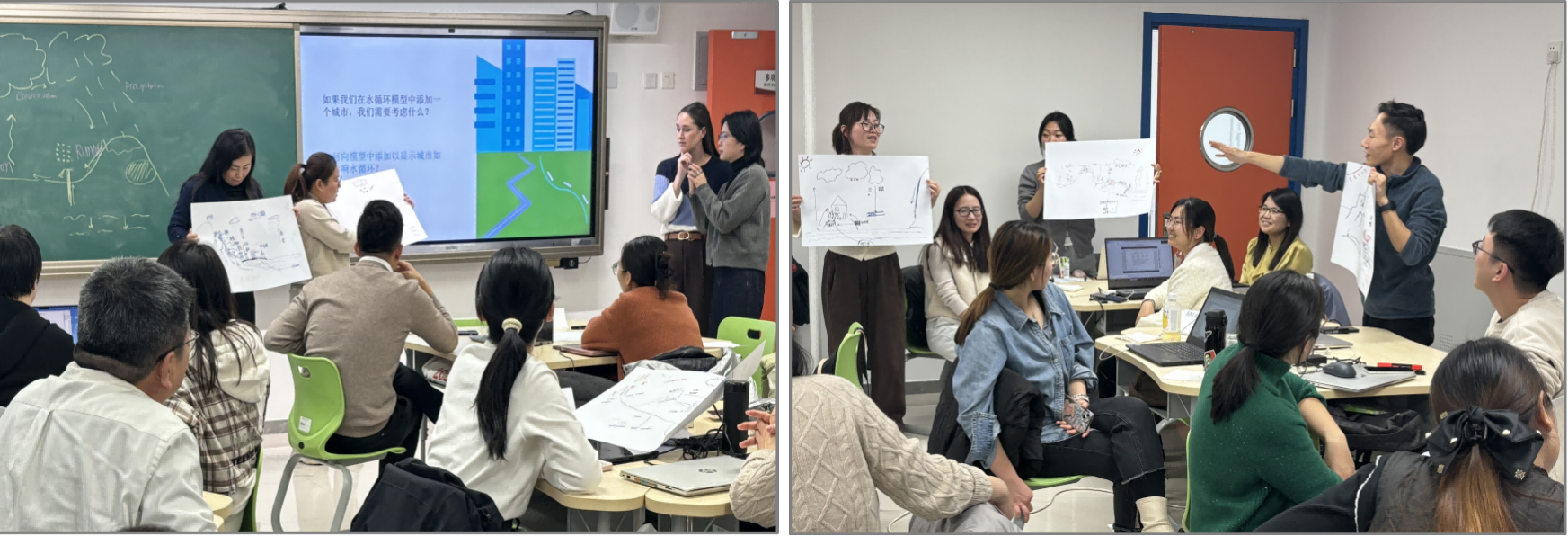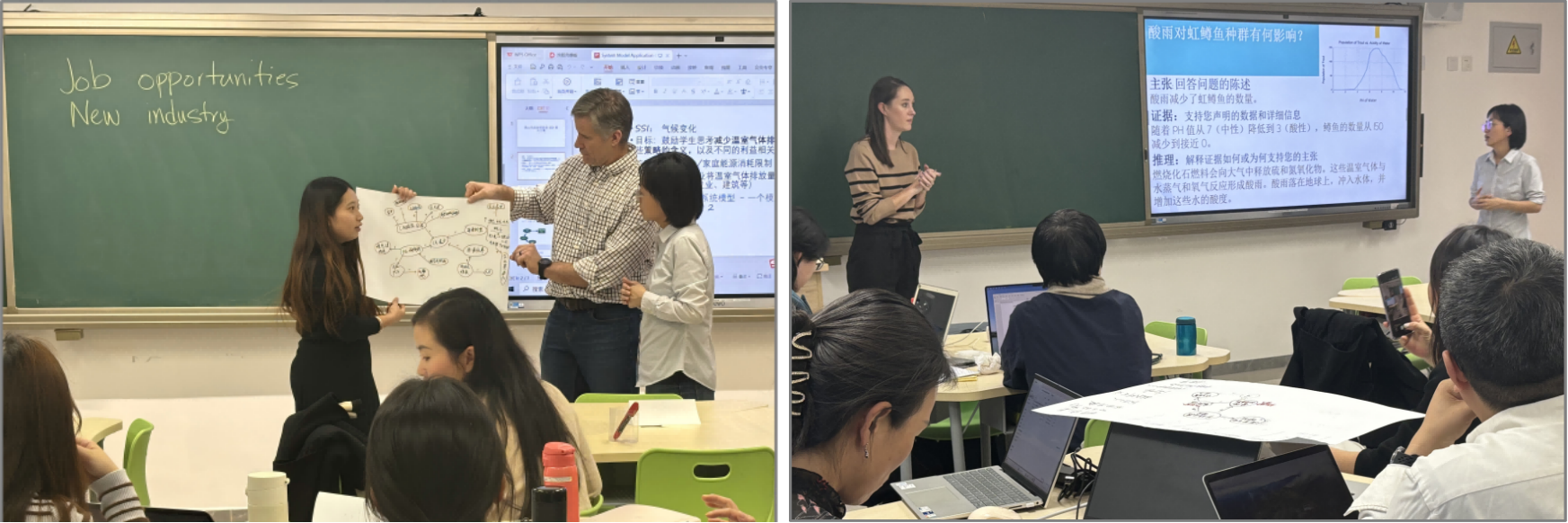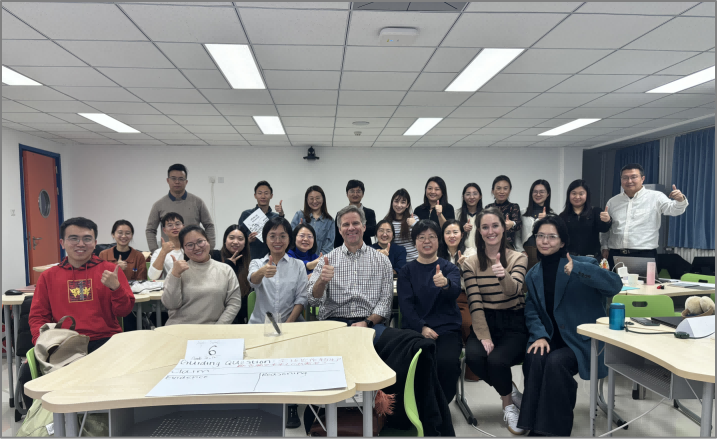为推动“社会性科学议题学习”教与学的研究与实践,帮助中小学教师基于社会性科学议题学习来提升中小学生科学素养,2024年12月15日至16日,由北京师范大学社会性科学议题学习项目组主办的“社会科学议题(SSI)教学方法和策略”工作坊在北京师范大学附属实验中学成功举办。本次工作坊特别邀请了美国北卡罗莱纳大学教堂山分校的杰出教授Troy Sadler和博士生Rebecca Lesnefsky作为授课专家,来自全国各地的SSI-L项目组合作团队骨干教师,以及项目办研究团队共同参加了本次工作坊。
12月15日上午9时,工作坊正式拉开帷幕。在第一个环节,Troy Sadler详细阐述了社会性科学议题的相关概念,并介绍了SSI-L实施模式的三阶段,即聚焦议题(Encounter Focal Issue)、深入探究(Develop)和系统整合(Synthesize)。在聚焦议题阶段,Rebecca Lesnefsky通过具体的教学实例“如果城市缺水零日临近,您会怎么做?”,展示了如何引入并引导参与者深入探讨相关议题,为后续的学习奠定基础。

下午,工作坊进入了SSI-L实施模式的第二阶段——深入探究阶段。探究阶段要明确科学概念和科学实践必然是相互依赖的,与 SSI 教学相一致的科学实践有构建解释、循证论证、开发和使用模型、分析和解释数据等。紧接着,专家们通过构建机制模型与系统模型两个活动阐释了SSI教学探究阶段的科学实践历程。其中,构建一个“人如何感染流感”的机制模型和“哪些因素会影响河流的水质?”的系统模型成为了讨论的重点,参与者明晰了两类建模实践活动的应用范式与意义。

12月16日,工作坊继续深入探讨SSI-L实施模式的第二阶段,学习支持社会性科学推理的实践方法,并以“多视角”和“复杂性”活动为例,引导参与者从多个角度思考议题,理解其背后的复杂性。紧接着,专家们重点讲解了SSI-L实施模式的第三阶段——系统整合阶段,即学习者需要有机会使用和应用他们所学到的知识。通过“大流行病单元”的实践案例,形象展示了如何创建一个带有证据的论点来支持学生的解决方案,进一步培养学生的社会性科学推理能力。工作坊的最后,Troy Sadler教授进行SSI-L设计的总结,并邀请与会者考虑自己的SSI设计,进行头脑风暴,为参会者提供了充分交流思想、碰撞火花的平台。

本次社会性科学议题教学工作坊为期两天,内容丰富,涵盖了SSI-L关键阶段的教学方法和策略。通过专家讲解和教学实例的展示,以及工作坊主持人、SSI-L项目负责人林静对工作坊内容的本土化阐述与现场追问,参会人员对社会性科学议题及SSI-L设计有了更深入的理解和认识。同时,通过头脑风暴等互动环节,参会人员也积极分享自己的观点和经验,促进了彼此之间的交流和合作。此次工作坊的成功举办,有利于进一步打造“社会性科学议题学习”核心骨干力量,助力SSI-L的本土深入研究与实践。

To promote research and practice in socio-scientific issues (SSI) teaching and learning and to help elementary and secondary school teachers enhance students' scientific literacy through SSI-based learning, the workshop on “SSI Teaching Methods and Strategies” was successfully held at the Experimental High School Attached to Beijing Normal University from December 15 to 16, 2024. This workshop was organized by the Socio-scientific Issues-based Learning Project Team of Beijing Normal University. Distinguished Professor Troy Sadler from the University of North Carolina at Chapel Hill and PhD candidate Rebecca Lesnefsky were specially invited as teaching experts. Backbone teachers from the SSI-L project teams across China, along with researchers from the SSI-L project office, participated in the workshop.
At 9:00 am on December 15, the workshop officially commenced. In the first session, Troy Sadler elaborated on the key concepts related to socio-scientific issues and introduced the three phases of the SSI-L implementation model: Encounter Focal Issue, Develop, and Synthesize. During the Encounter Focal Issue phase, Rebecca Lesnefsky used a specific teaching example, “If Day Zero of urban water shortages is approaching, what would you do?” to demonstrate how to introduce and guide participants in deeply exploring related issues, laying the foundation for subsequent learning.
In the afternoon, the workshop moved into the second phase of the SSI-L implementation model—Develop. This phase emphasizes that scientific concepts and scientific practices are inherently interdependent. Science practices aligned with SSI teaching include constructing explanations, evidence-based argumentation, developing and using models, and analyzing and interpreting data. Next, the experts explained the scientific inquiry process in the Develop phase of SSI teaching through two activities: constructing mechanism models and system models. Between them, constructing a mechanism model on “How do humans get infected with influenza?” and a system model on “What factors influence river water quality?” became the focal points of discussion. Participants better understood the application paradigm and significance of these two types of modeling practices.
On December 16, the workshop continued to explore the second phase of the SSI-L implementation model in depth, focusing on practical methods to support socio-scientific reasoning. Through activities on “Multiple Perspectives” and “Complexity,” participants were guided to consider issues from various perspectives and understand the underlying complexities. Following this, the experts emphasized the third phase of the SSI-L implementation model—Synthesize, where learners need opportunities to use and apply their acquired knowledge. Using a pandemic unit as a practical case study, the experts demonstrated how to construct an argument with supporting evidence to help students develop solutions, further enhancing their socio-scientific reasoning abilities. At the end of the workshop, Professor Troy Sadler summarized the SSI-L design and invited participants to brainstorm and consider their own SSI designs, providing a platform for the exchange of ideas and intellectual collaboration.
This two-day workshop on socio-scientific issues (SSI) teaching covered extensive content, including teaching methods and strategies for the key phases of SSI-L. Through expert lectures, teaching demonstrations, and localized interpretations and on-site questions raised by Lin Jing, the workshop host and head of the SSI-L project, participants developed a deeper understanding of SSI and SSI-L design. Meanwhile, interactive sessions such as brainstorming encouraged attendees to actively share their perspectives and experiences, fostering mutual exchange and collaboration. The successful conclusion of this workshop contributes to strengthening the core team for socio-scientific issues learning and advancing the localized research and practice of SSI-L.
